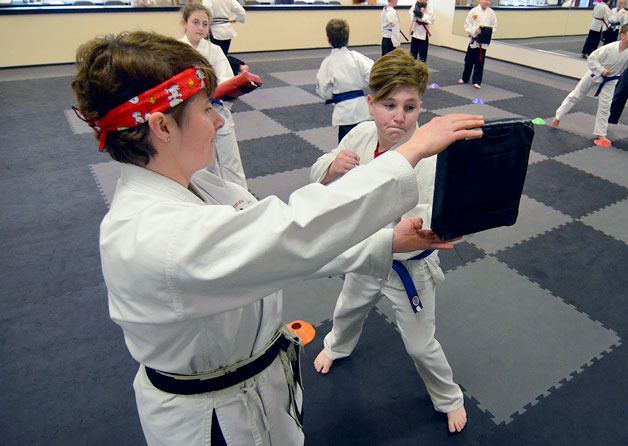Martial arts businesses on South Whidbey and across the state this week are sweating over the fate of a bill that will either live or die by Thursday.
The bill, SB 2334, seeks to reverse a decision last year that forced the industry to begin charging sales tax for services, while businesses teaching yoga or tai chi remained exempt. Though a house bill proposing the revision passed unanimously in February, its counterpart in the senate, as of Tuesday morning, remained in the Senate Ways & Means Committee.
The legislative session ends on Thursday.
Wendi Barker, owner of Tiger Martial Arts in Freeland, said her business doesn’t hinge on the success or failure of the bill, but that it will have impacts, particularly for financially struggling parents who have multiple children attending her school.
She also said the basis for the change last year, that martial arts studios are more akin to gyms than schools, is unfair and inaccurate.
“We’re teachers,” she said. “We teach about bullying, self defense — we’re a school.”
Robert Armstrong, owner of Armstrong’s Tae Kwon Do in Clinton, echoed those sentiments.
“I totally agree with Sensei Barker, the bigger families will feel the crunch,” he said.
“And I take insult that we’re not a school; we’re not a gym.”
Calls to Sen. Barbara Bailey, R-Oak Harbor, who serves on the Senate Ways and Means Committee, were not returned by press time on Tuesday.
This past year, martial arts facilities were reclassified and required to charge sales tax like gyms or fitness centers. A specific exclusion was provided for yoga, tai chi, and chi gong classes that are held in facilities which are not primarily used for physical fitness activities, such as a community center, school, or standalone yoga studio, according to the senate bill report. For business and operation tax purposes, these activities are classified as service and other rather than retailing, the report said.
While industry leaders protested the move, quickly criticizing it as being discriminatory to the martial arts and lobbying for the bill, some didn’t even know the state had changed the rules.
“I didn’t know about it until last week,” Barker said. “The state never notified me.”
She said she had no other choice but to send her 76 students back bills, requesting the difference over the past few months. It was “humbling,” she said.
Armstrong did know about the change as many tae kwon do businesses throughout the state were affected and he heard about it from colleagues; Barker teaches Uechi-ryu, and is the only one in the state to do so, she said.
Bayview resident Kevin Hilton, who’s 10-year-old son Andrew is enrolled at Tiger Martial Arts, said the sales tax is an added cost but that it’s well worth the expense and that the reasoning behind the tax — that it’s an exercise facility rather than a school or educational service — seemed silly.
“The service that Wendi provides is so much more than exercise,” Hilton said.
His son has learned discipline, focus, personal development and growth, and how to deal with issues such as bullying without the use of violence. The change in his son’s behavior when he’s participating in other sports that take him away from Tiger Martial Arts is noticeable, such as in the sass or “backtalk” department, he said.
Leaving the tax in place would be a “huge disservice” to South Whidbey youths, he said.


